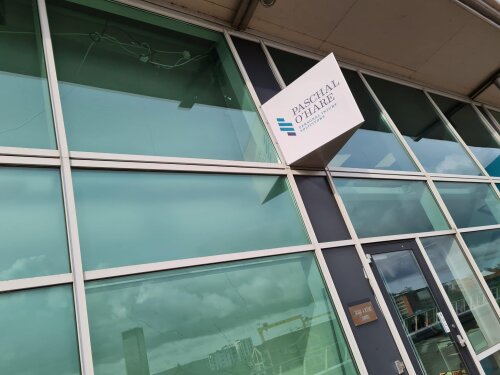Best Construction Accident Lawyers in Belfast
Share your needs with us, get contacted by law firms.
Free. Takes 2 min.
List of the best lawyers in Belfast, United Kingdom
About Construction Accident Law in Belfast, United Kingdom
Construction accident law in Belfast sits within the wider framework of Northern Ireland health and safety and personal injury law. It covers the rights and obligations of employers, contractors, sub-contractors, site managers and self-employed people when someone is injured or killed while working on, or near, a construction site. Where negligence, breaches of statutory duties or unsafe systems of work cause injury, an injured person - or their dependants in a fatal case - may have the right to bring a civil claim for compensation and to pursue remedies through regulatory or criminal processes administered by the Health and Safety Executive for Northern Ireland and other public bodies.
Why You May Need a Lawyer
Construction accident cases often involve technical causes, multiple parties and complex insurance arrangements. You may need a lawyer if any of the following apply:
- You suffered significant physical injury, long-term disability, or loss of earnings.
- More than one employer, contractor or designer might share liability.
- Your employer disputes responsibility or says you were at fault.
- The accident caused a fatality and dependants need to make a claim.
- There are parallel criminal or regulatory investigations by the regulator - for example, prosecutions under health and safety law - which can affect evidence and timing.
- You need help valuing future care needs, loss of pension, or ongoing treatment costs.
- You require interim payments to cover urgent bills while a claim is pursued.
A construction accident solicitor provides legal and technical knowledge, preserves evidence, negotiates with insurers, and represents you in court if settlement is not possible.
Local Laws Overview
Key legal features that affect construction accident claims in Belfast include statutory health and safety duties, civil liability principles, reporting requirements and time limits for bringing claims. Important points to keep in mind are:
- Statutory duty-bearers: Employers, designers, contractors and site managers owe duties under Northern Ireland health and safety law to ensure, so far as is reasonably practicable, the health, safety and welfare of workers and others affected by their work.
- Construction-specific rules: Regulations that apply to design, planning, site management and worker safety impose duties on clients, designers and contractors to plan and manage risk on construction projects.
- Reporting of serious incidents: Employers and duty-holders are required to report certain work-related deaths, major injuries and dangerous occurrences to the Health and Safety Executive for Northern Ireland - this creates a contemporaneous record and may trigger an investigation.
- Civil claims and negligence: If a duty of care is breached and that breach causes foreseeable injury, the injured person can normally bring a civil claim against the party or parties responsible to seek damages for pain and suffering, financial losses, care and future needs.
- Time limits: Limitation rules generally impose a three-year time limit for personal injury claims - the clock usually starts on the date of injury or on the date the injured person knew, or ought to have known, that the injury was linked to the incident or workplace exposure. There are different rules for children and for actions against public bodies. It is important to check limits early.
- Criminal and regulatory action: Breaches of health and safety laws may lead to enforcement action or prosecution by the regulator and can run alongside civil claims.
- Insurance and employer liability: Employers in the construction sector are typically insured for liability. Where the injured person is self-employed or working for a contractor, insurance arrangements and contractual allocations of responsibility can complicate a claim.
Frequently Asked Questions
What should I do immediately after a construction accident?
Get medical attention first - for your safety and to create a medical record. Report the incident to your employer or site manager and ensure the event is recorded in the site accident book. Take photos, note the location, record witness names and contact details, and preserve any clothing or equipment involved. Avoid admitting fault or apologising. If the injury is serious, make sure the incident is reported to the regulator as required.
Can I claim compensation if I was partly to blame?
Yes. Under Northern Ireland personal injury law, contributory negligence reduces compensation in proportion to your share of responsibility rather than barring a claim altogether. A solicitor can advise on likely apportionment and the impact on your settlement.
How long do I have to start a claim?
Time limits vary, but most personal injury claims must be started within three years of the date of injury or the date you became aware that your injury was linked to work. Special rules apply for children and for industrial disease claims where symptoms may emerge over time. Seek legal advice promptly so you do not miss a deadline.
Who can I sue after a construction accident?
Possible defendants include your employer, principal contractor, sub-contractor, client, designer or manufacturer of defective equipment - anyone who owed a duty of care and breached it. Liability often depends on who controlled the site, who provided equipment, and contractual arrangements between parties.
What if I am self-employed or a subcontractor?
Self-employed people and subcontractors can bring a claim if another party was at fault - for example a principal contractor who failed to provide a safe system of work or failed to maintain equipment. Contracts and insurance arrangements are important in these cases, so retain any agreements and insurance documents and get legal advice early.
Do I need a solicitor and how do I choose one?
A specialist solicitor is highly recommended for construction accident claims because of technical issues and multiple potential defendants. Look for experience in construction personal injury work, knowledge of local courts and regulators, clear fee arrangements, and client testimonials. Make sure the solicitor is authorised by the Law Society of Northern Ireland and ask about funding options, including conditional fee arrangements.
Will my case go to court?
Many cases settle without a full court hearing after evidence is exchanged and negotiations with insurers. However, if parties cannot agree, your solicitor will prepare to take the case to court. Court proceedings can be necessary where liability is contested or quantum cannot be agreed. Your solicitor will explain the likely timetable and costs.
What kinds of damages can I claim?
Typical heads of claim include general damages for pain and suffering, and special damages for financial losses such as past and future loss of earnings, medical and rehabilitation costs, care and support needs, pension loss and equipment or home adaptations. Future care and loss assessments often rely on expert evidence from medical and vocational specialists.
What about criminal investigations and enforcement action?
The Health and Safety Executive for Northern Ireland may investigate serious accidents and can bring prosecutions for breaches of health and safety law. These criminal or regulatory proceedings are separate from civil claims. They can produce useful evidence, but they may also affect timing and disclosure. Your solicitor will co-ordinate the civil claim with information from any investigation.
Can dependants claim for a fatal construction accident?
Yes. If a construction accident results in death, dependants - such as a spouse or child - may bring a wrongful death claim for bereavement damages and financial losses associated with the deceased person’s death. There are also mandatory reporting and coroner procedures in fatal cases, and legal guidance is important early on.
Additional Resources
Health and Safety Executive for Northern Ireland - the regulator responsible for workplace safety and accident investigations.
Law Society of Northern Ireland - for finding and checking solicitors authorised to practice in Northern Ireland.
Citizens Advice - for general guidance on rights and practical next steps after an accident.
Northern Ireland Courts and Tribunals Service - for information about civil court procedures and time limits.
Construction Industry Training Board - Northern Ireland - for industry guidance, training and safety standards.
Royal Society for the Prevention of Accidents - for safety advice and resources that can help prevent workplace incidents.
Department for Work and Pensions - regarding Industrial Injuries Disablement Benefit and other welfare support you may be entitled to after a workplace injury.
Next Steps
1. Seek medical attention and obtain a written record of injuries.
2. Report the accident to your employer and ensure it is recorded. Ask for a copy of the site accident report.
3. Preserve evidence - take photos, keep clothing and equipment, and write a contemporaneous diary of how the injury affects you.
4. Collect witness details and any contract or insurance documents relevant to the project.
5. Notify your insurer if you are self-employed and keep records of all expenses and time off work.
6. Contact a specialist construction accident solicitor for an initial assessment - ask about experience, likely timescales and funding options. Early legal advice helps protect your rights and preserves important evidence.
7. If the accident caused a death, seek immediate legal and practical advice about coroner procedures and dependent claims.
Acting promptly improves the chance of securing a fair outcome. A specialist lawyer will help you understand liability, gather evidence, instruct medical and technical experts, negotiate with insurers and, if needed, represent you in court.
Lawzana helps you find the best lawyers and law firms in Belfast through a curated and pre-screened list of qualified legal professionals. Our platform offers rankings and detailed profiles of attorneys and law firms, allowing you to compare based on practice areas, including Construction Accident, experience, and client feedback.
Each profile includes a description of the firm's areas of practice, client reviews, team members and partners, year of establishment, spoken languages, office locations, contact information, social media presence, and any published articles or resources. Most firms on our platform speak English and are experienced in both local and international legal matters.
Get a quote from top-rated law firms in Belfast, United Kingdom — quickly, securely, and without unnecessary hassle.
Disclaimer:
The information provided on this page is for general informational purposes only and does not constitute legal advice. While we strive to ensure the accuracy and relevance of the content, legal information may change over time, and interpretations of the law can vary. You should always consult with a qualified legal professional for advice specific to your situation.
We disclaim all liability for actions taken or not taken based on the content of this page. If you believe any information is incorrect or outdated, please contact us, and we will review and update it where appropriate.














